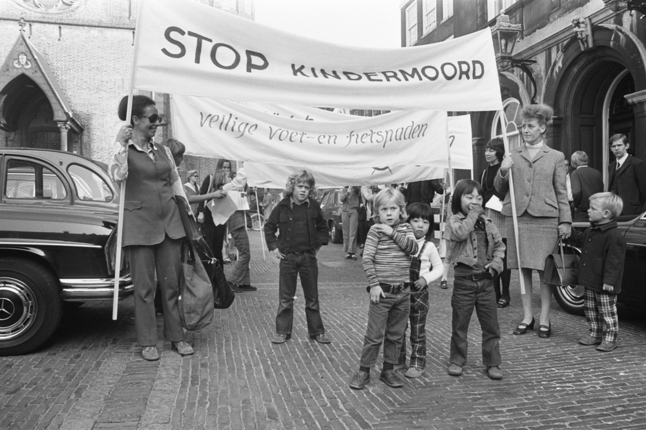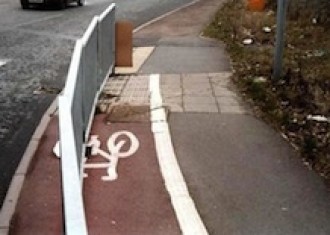cycling infrastructure
Dinosaur MPs on Britain’s Transport Committee
Link Posted on Updated on
Dinosaur MPs on Britain’s Transport Committee
For the many of you fortunate enough to not view the committee’s near two-hour session about cycle safety on Monday afternoon, I can tell you that there are scarcely enough words to describe how disheartening and shambolic it was. To give you a flavour of one journalist’s reaction, follow this link to see a collation of running tweets from the event.
The session followed the recent deaths of six cyclists in London and saw the 11-member committee first quiz a series of cycling representatives and police, then a trio of bigwigs from the road haulage world, along with Andrew Gilligan, cycle adviser to London’s mayor, Boris Johnson, and an expert from the Transport Research Laboratory.
For the most-part, it seemed as if the MPs were concerned with minor issues. For instance, Sarah Champion (Labour MP) wondered whether helmet use could be made compulsory. How a bike helmet is supposed to help someone crushed by an HGV is something that we might wonder in response… The headphones issue was also raised.
Following this, Jason McCartney (Tory MP) asked if there was a war going on between cars and bikes. His party colleague, Martin Vickers, then asked – and he was being entirely serious – if the panel felt cyclists should “contribute” financially to the upkeep of roads. Yes, that’s right. The road tax question, the litmus test for someone who not only doesn’t understand the very basics about cycling policy but hasn’t the barest minimum of intellectual curiosity about it. Silly enough in a pub conversation. For an MP, let alone an MP on the transport select committee, let alone an MP on the transport select committee discussing cycling, it’s unforgivable.
An extract from a Guardian article on the subject encapsulates some real truths about how cycling issues are addressed by the people in power:
“…when it comes to cycling policy in Britain, we remain, for the most part, in the age of the dinosaur. The odd politician talks an occasional good game on bikes, but look at too many mainstream MPs and we’re right back in the 1960s, where bikes are a toy, or a faddish “pursuit”, perilous and mistrusted, while all must lie down in homage to “the economy”, a narrowly-defined set of interests with motorised pistons beating at their heart.”

Jim Dobbin (Labour MP) then proceeded to regale the committee with a series of anecdotes about misbehaving cyclists and scratched car paintwork before suggesting that currently cycle safety woes could be addressed by requiring cyclists to register themselves and their bikes, and to pass proficiency tests in order to gain a cycling licence.
Although many people may believe that Dobbin’s prescription is a good one, it is worth remembering that not a single country on this planet implements these things for the simple reason that they massively curtail bicycle use. Bicycles don’t have the capacity to be the killing machines that cars and lorries sometimes are, and cyclists don’t produce CO2 or damage the roads to the same degree as motor vehicles; requiring them to be registered and licensed (presumable at some cost) seems a preposterous and misguided contribution to a meeting about cycle safety. And while cycling proficiency is a reasonable issue, no one at the committee meeting seemed aware of the bikeability scheme.
Part two was possibly even more depressing still. The MPs, who had been quite interrogative towards the cycle groups (albeit mainly on irrelevancies) gave the haulage group representatives a far easier time. Jack Semple, policy head of the Road Haulage Association, was left utterly unchallenged when he repeatedly singled out cyclist behaviour as the reason for them being killed by lorries; an assertion for which there is, as far as I understand, no evidence.
What was missing from the committee meeting was an acknowledgement of the fact that cities are changing places. Whereas once they competed on things like skyscrapers and parking spaces, the most desirable cities in the world are now places where there is an emphasis on liveability – a more human-centred approach. People don’t want to live with urban motorways and the noise, congestion, and pollution that they bring with them. The nicest cities are more pedestrianised, with pavement cafes, and safe, communal spaces. They also prioritise (and even incentivise) walking and cycling in such a way as to make them more convenient than driving (just look at Groningen in The Netherlands for the perfect example).
To illustrate this point, it is worth noting that there are three big annual lists of the world’s most liveable cities. Not one of them features anywhere in the UK.
Things clearly need to change, and the mass extinction of political dinosaurs seems to be a necessary first step.
Dutchman isn’t impressed by London’s cycling infrastructure
Video Posted on Updated on
A brief analysis of cycling conditions in London from David Hembrow.
As a Dutchman, Hembrow highlights the shortcomings of British infrastructure that we have to live with. He makes the point that not only are the roads inadequate for cyclists, but that they aren’t really serving motorists much better either.
More than anything else, the thing that really struck me about this video was the shear volume of noise coming from the road. Motor vehicles make the urban environment a really unpleasant place to be.
Another video that focuses specifically on the shortcomings of London’s CS2 can be found here
Related articles
- London’s ‘cycling superhighways’ are ideal … for kamikazes | Charles Montgomery (theguardian.com)
- Cycle deaths leave London bewildered (bbc.co.uk)
- Upgrade London’s CS2 to Continental Standards – call to arms (dutchbikeguy.wordpress.com)
Cycling as Key to Happy Cities
Link Posted on Updated on
Cycling as Key to Happy Cities
“In the third year of his term, Peñalosa challenged Bogotáns to participate in an experiment. As of dawn on 24 February 2000, cars were banned from streets for the day. It was the first day in four years that nobody was killed in traffic. Hospital admissions fell by almost a third. The toxic haze over the city thinned.”
Great article from The Guardian on the happiness that cycling can bring to a society. I would love for the UK to experiment with some car-free days in our cities, just so people can see how preferable it is. We’d need some more visionary leaders for that to happen though…

Researchers for Hewlett-Packard convinced volunteers in England to wear electrode caps during their commutes and found that whether they were driving or taking the train, peak-hour travellers suffered worse stress than fighter pilots or riot police facing mobs of angry protesters.
Related articles
- Ban lorries from cities, says Boardman, as sixth cyclist dies (thetimes.co.uk)
- Evening Standard comment: London needs a fresh approach to cycling (standard.co.uk)
- Cycling to work popularity revealed (standard.co.uk)
- VIDEO: Views on London Cycle Superhighways (bbc.co.uk)
- VIDEO: Inside a robotic cycle park (bbc.co.uk)
- Cycling = Happiness (alternativemiddleclass.com)
100 miles of Dutch-Style Bike Lanes planned for Bristol
Link Posted on Updated on
100 Miles of Dutch-Style Bike Lanes for Bristol
In a bid to save lives and reduce the fear factor preventing people from taking to two wheels, Bristol is to announce radical new proposals which will make it Britain’s first city to adopt a truly Dutch-style network of cycle lanes.
Already the UK’s top cycling city with an estimated 16,000 regular cyclists, the 100 miles of cycle paths are due to be operational as soon as Spring 2014!
In contrast to this fantastic news, the national picture is comparatively bleak. With cycle uptake ever on the increase, the number of cyclists killed or injured on Britain’s roads is at its highest for three years: 118 deaths and 3,222 injuries recorded in 2012. Although these figures represent regrettable injuries and tragic loss of life, statistics like these are what motivated the Dutch to unite as a nation and demand the changes that led to their precedent-setting infrastructure.


In other (related) news, a new peer-reviewed study has revealed that financial investment in cycling infrastructure can increase the share of journeys taken by bike. This might seem like the predictable answer to another do-bears-poop-in-the-woods sort of question, but it’s not always cut-and-dried that spending to achieve a goal actually works. Look at roadbuilding, for instance: billions of pounds are pumped into constructing new roads in order to reduce congestion, yet congestion keeps on increasing.
Ridiculous, unnecessary, and obvious as it seems, it’s still good press. Click here for the Guardian article.

Related articles
- Dutch-style bike lanes set for roll-out in Bristol – Britain’s cycling capital (independent.co.uk)
- City’s ‘Dutch-style’ bike lane plans (bbc.co.uk)
- Move over Amsterdam, the London cycling revolution is in top gear (standard.co.uk)
- New Denver Bike Lanes Not Only Safer, Good For Business (denver.cbslocal.com)
